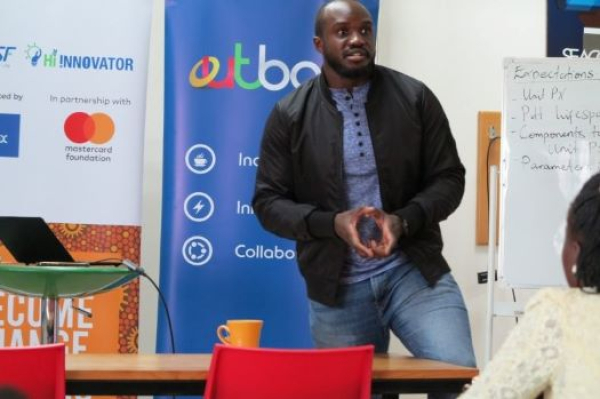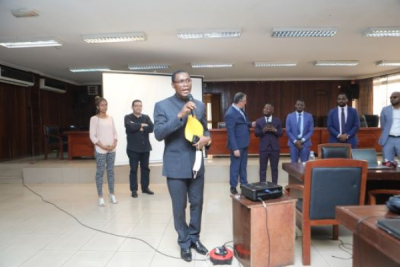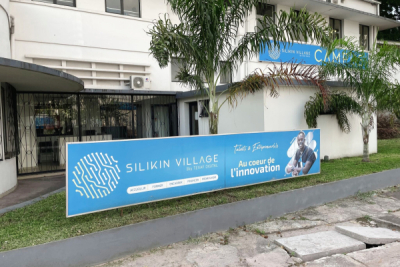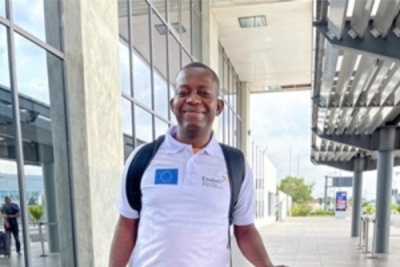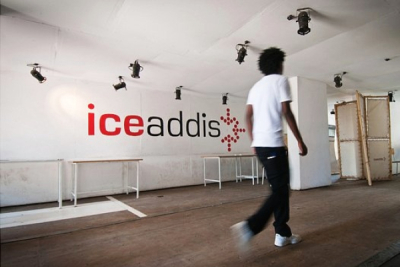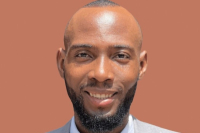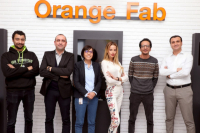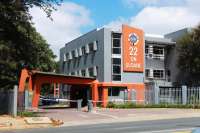
TECH STARS (1007)
Outbox Hub plays a key role in promoting tech entrepreneurship. Since its inception, it has established a solid reputation as a catalyst for innovation and an invaluable support for budding entrepreneurs.
Outbox Hub is a tech innovation space and incubator based in Uganda. Founded in 2012 by Richard Zulu, also its director, it helps new and aspiring African entrepreneurs keen to use technology to create high-growth businesses.
With its modern and inspiring collaborative workspace, Outbox Hub offers an environment that fosters creativity and idea sharing. Like all incubators, it does not provide just workspaces but also offers comprehensive incubation programs that help startups turn their ideas into sustainable businesses. Selected entrepreneurs benefit from personalized mentoring, specialized training, business consulting, and access to a network of experts and investors.
In collaboration with its partners NSSF Uganda, Mastercard Foundation, JICA, World Food Programme (WFP), USAID Uganda, AfriConEU, Ye! ITC Community, etc., the incubator launched several initiatives to promote youth involvement in the tech industry. These initiatives include UpAccelerate, a one-year initiative to support young entrepreneurs tackling the challenges of sexual and reproductive health in Uganda. There is also the NSSF Hi-Innovator learning lab for agricultural businesses launched on Thursday, June 15, 2023.
Outbox Hub also designs and develops technological solutions that enable organizations to accelerate their social impact. It works to increase the number of women and girls in technology through the conferences and training courses it organizes under its Women in Technology program.
Melchior Koba
The software engineer develops fintech solutions for various purposes in the growing fintech industry in Africa.
Andry Randriamanamihaja (photo) is a Malagasy entrepreneur and computer engineer. He graduated from Polytechnic ISPM (Madagascar) in 1998, with a master's in business computing, software engineering, and artificial intelligence. He is also a certified digital finance practitioner.
In 2018, he officially launched the fintech company Vanilla Pay to dynamize the financial sector in his home country. The first tech solution he developed through Vanilla Pay is a mobile payment aggregator that enables business professionals to make online sales securely, conveniently, and automatically. The aggregator integrates all of Madagascar's mobile operators and is now used by universities, training centers, and e-businessmen. The aggregator claims nearly 50,000 active users with a peak of 3,000 financial transactions processed every minute.
Apart from the payment aggregator, the fintech company plans to launch an international payment solution geared toward tourists. The solution, called Vanilla Pay International, will be presented for the first time during the International Tourism Fair Madagascar that started yesterday, June 15. It is an e-wallet that enables tourists to directly send funds to residents’ mobile money accounts once in Madagascar.
Andry Randriamanamihaja, who was incubated by Orange Fab in 2019, tells We Are Tech Africa that he wants to turn Vanilla Pay into a unicorn valued at millions of euros within five years. The VivaTech 2022 participant already has some ideas to make that ambition a reality. He for instance plans to develop a blockchain-based system for real-time money exchange between islands in the Indian Ocean.
Before Vanilla Pay, Andry Randriamanamihaja founded Ariary.net in 2015, a start-up that aimed to revolutionize the financial landscape in Madagascar and democratize online payment.
His professional career began in 1998 with the IT company Advanced Information Systems, where he was an offshore project manager. From 2003 to 2009, he worked on a World Bank project to set up a Public Expenditure Management Information System.
Melchior Koba
In recent years, Cameroon has witnessed the multiplication of entrepreneurship support institutions. One of the main ones is the CDIC, launched by the government to promote tech innovation.
The Cameroon Digital Innovation Centre (CDIC) is a national incubator and center of excellence for digital research, development, and innovation. Launched on February 8, 2022, by the Ministry of Posts and Telecommunications, it supports start-ups offering digital solutions in key sectors in Cameroon.
CDIC's role is to incubate and mentor digital project leaders, facilitate relations between start-ups and public administrations, assist start-ups in launching their activities, and stimulate job creation for graduates. It also supports start-ups in their search financing and strengthens technology watch and international cooperation in the digital field.
The center has a co-working space to encourage collaboration between start-ups. It organizes events, consulting sessions, mentoring programs, and other workshops run by leading digital companies, exclusively for tech start-ups. It also has connected classrooms ideal for all types of online training. The classrooms feature a digital screen, enabling more interactive and immersive training.
Thanks to its multimedia space, which includes a recording room and a spacious control room, the center provides entrepreneurs with the right technical conditions and an atmosphere conducive to strategic thinking and the development of audio and video content.
With its highly connected and secure data center, it guarantees digital sovereignty and data protection. It has a digital manufacturing laboratory equipped with several high-end 3D printers adapted to the needs of start-ups and for prototyping problems. It offers cloud computing solutions including several innovative services such as virtualization.
By creating that infrastructure, the Cameroonian government wants to build a genuine local digital industry able to create thousands of direct and indirect jobs, professionalize skills in the digital field, and accelerate the country's digital transformation.
Melchior Koba
Silikin Village is an innovation hub dedicated to catalyzing growth in the Democratic Republic of Congo (DR Congo). Its primary goal is to establish a digital entrepreneurship ecosystem that provides support to both local and international partners and entrepreneurs.
Silikin Village is an entrepreneurship and innovation hub established in the heart of Kinshasa in the Democratic Republic of Congo. It is a platform dedicated to learning, entrepreneurship, and innovation, bringing together learners, project leaders, entrepreneurs, small and medium-sized enterprises, large corporations, and private and public partners interested in employability solutions.
As a catalyst for start-ups and businesses, it focuses on identifying talent and developing innovative products and services. It is led by Raymond Mendy who boasts decades of executive experience in the telecom, marketing, and even entrepreneurship industries.
Founded in 2020 by Texaf, a local company operating in the real estate, mining, and digital sectors, Silikin Village wants to become one of Africa’s largest entrepreneurial hubs. It provides entrepreneurs with modern office, training, meeting, and event spaces. The fully-equipped collaborative workspaces offer the opportunity to network with employees from other companies, including entrepreneurs, freelancers, and teleworkers.
The innovation hub offers short-term training courses focusing on technical and managerial skills. Its training programs include No-Code, developed in collaboration with Le Plan B, a no-code training platform. The program enables learners to create single and multi-page websites, generating interaction with their target audiences.
Apart from its training programs, Silikin Village also implements support programs to help entrepreneurs take their startups from the ideation to the acceleration phase. It allows them access to project structuring, strategic support, and its business network, in short to everything they need to develop their projects.
The innovation center collaborates with a multitude of institutions and agencies supporting innovation in Africa. These include Trace Congo, Kinshasa Digital Academy, Kinshasa Digital, Africa Green Power, Upsail Africa, and Ingenious City.
Melchior Koba
He is an economics expert with some 14 years of experience in the cereals industry. A few years ago, he co-founded an agritech company focused on the cereal segment.
Steve Hoda (photo) is a Beninese economist trained at the Faculty of Economics and Management Sciences of the University of Abomey-Calavi, where he graduated with a Master’s in Economics in 2009.
In 2017, he co-founded AfriRice, the agritech company that is now known as AfriCereal Group. His agritech company develops and implements innovative agriculture solutions, with a particular focus on cereal crops. It provides mechanization solutions for agricultural operations, offers technical assistance to farmers, and facilitates the connection of various stakeholders in the cereal industry.
The company aims to simplify agricultural tasks, minimize post-harvest losses, boost agricultural productivity, and improve farmers' incomes. With its solutions tailored to the African continent, AfriCereal Group is committed to providing safe and nutritious food worldwide. It works with non-governmental organizations and government institutions, assisting farmers in their agricultural campaigns from plowing to commercialization. It operates in the West African sub-region, particularly in Côte d'Ivoire, Burkina Faso, Togo, and Benin.
Its CEO, Steve Hoda, is the head of the agriculture commission of She is Great Benin, a program that encourages girls in STEM. He is also the coordinator of the Beninese chapter of the International Alliance for Sustainable Development Goals (AIODD). The agritech entrepreneur is an economic expert for local media outlet Le Soleil Bénin and also in charge of the management of a mini rice mill installed in Kérou, Northwestern region of Benin.
Between 2010 and 2011, he worked as an assistant to the Deputy Secretary-General for budget/program monitoring and evaluation at the Beninese Ministry of Development, Economic Analysis, and Prospective.
In 2018, AfriRice was celebrated by the FAO as one of the 20 success stories of agricultural innovations able to reduce hunger. The team was also selected by the US African Development Foundation to receive about $100,000 in grants to mechanize agricultural operations in three major rice and soybean production areas in Benin.
Melchior Koba
iceaddis is a major player that is advancing tech innovation in Ethiopia. As a dynamic innovation hub, it offers a collaborative workspace, incubation programs, and a wealth of resources to support the country's entrepreneurs and innovators.
iceaddis is an Addis Ababa-based innovation and entrepreneurship center that is key in strengthening Ethiopia's tech ecosystem. It was founded in 2011 by three former GIZ (German Development Agency) staff in Ethiopia, namely Markos Lemma, Florian Manderscheid, and Oliver Petzoldt,
The heart of its ecosystem lies in its co-working space, an open environment where entrepreneurs, developers, and creatives can come together, share ideas, and collaborate on joint projects. The space fosters the creation of strong networks and stimulates entrepreneurship by offering practical support and mentoring opportunities.
In addition to the coworking space, iceaddis offers incubation programs to help start-ups turn their ideas into successful businesses. These programs offer personalized coaching, access to experienced mentors, and funding opportunities to help entrepreneurs get their businesses off the ground.
Its flagship program is ice180, a 180-day support program designed to enable high-potential entrepreneurs to start their businesses. The program aims to make startups investment-ready “with entrepreneurial knowledge skills, and a strong networking.”
iceaddis is also committed to defending the interests of technology start-ups. As one of the founding members of the i4policy community, it advocates innovative companies and start-up communities to policy-makers and regulators. The innovation center regularly organizes conferences, competitions, and hackathons, enabling participants to share knowledge, develop skills, win awards, and foster collaboration.
To date, it has supported over 190 entrepreneurs, accelerated 35 startups, and incubated 54 companies. It has also organized over 350 events, bootcamps, and hackathons in Ethiopia. The center works with local and international organizations as advisors on youth programs and joint project management in various sectors.
Melchior Koba
He is an outstanding software developer with over 14 years of experience in building software and web applications. In his home country, Tanzania, he set up an online bus ticket booking application.
Abraham Itule (photo) is a Tanzanian entrepreneur and computer scientist with a degree in Information Technology from Manchester University in 2012. In 2022, he founded Safiri App, a mobile app that allows users to buy bus tickets in Tanzania.
Safiri App connects transport operators and travelers, enabling customers to buy their travel tickets from the comfort of their home, office... It also provides travelers with real-time updates on the location of the means of transport and other transit information.
Safiri App users can also entrust parcels or goods to be conveyed by transport companies registered on the platform. For bus operators, the company offers a simple ticketing system that integrates mobile money and SMS.
Recently, the mobile app has been selected among the 12 African start-ups to attend the Africa Tech Summit in London on June 23. On this occasion, Abraham Itule will be speaking about public transport and logistics in Africa.
Safiri app was launched through Itule Limited, Abraham Itule’s software company. Besides his duties as the CEO of that software company, the tech entrepreneur is also the CTO of UK-based Hexis, which uses artificial intelligence to create a personalized nutrition plan to optimize the performance of athletes and coaches.
His professional career began in 2009 with Zippro System Ltd, where he worked as a programmer in the UK. Since then, he has worked as a developer, both back-end and front-end, at several institutions, including The Virtu Group, Spindrift, IBM, Cambridge University Press, Santander UK, and Instant Access Technologies. In 2021, he was a senior full-stack engineer at UK financial technology company Akrod.
Melchior Koba
For 10 years, he worked for two of Nigeria’s largest banks, handling operations and customer relations. He then moved into technology and founded one fintech company and an internet marketing agency.
Chibuike Goodnews (photo) is a Nigerian fintech entrepreneur who graduated from Ahmadu Bello University in 2015 with a master's in finance, and from the Lagos Business School, where he trained in entrepreneurship development. He is the co-founder and director of Astravest, a fintech company founded in 2021.
The company, co-founded with Joshua Chinemezu (a software engineer), offers savings and investment solutions that aim to empower users and help them achieve financial freedom. It gives Africans access to multiple investment options, the information they need to make decisions, and a simple platform to grow their money or move their funds between different sectors.
With just 5,000 naira, or around $10.5, users can invest in commodities, real estate, or fixed-income assets. Astravest enables companies to offer real estate investments as a service. It is sufficiently secure, and users have to go through a vetting process before making investments.
Apart from Astravest, Chibuike Goodnews also founded Dochase Adx, an internet marketing agency launched in 2016. Through that agency, he provides a full range of marketing solutions to help both large and small businesses attract sales and reach target markets online.
Before becoming an entrepreneur, he worked for United Bank for Africa (UBA) as a banking executive between 2005 and 2006 and as a customer relationship manager from 2013 to 2016. Between 2006 and 2013, he was in charge of banking operations at Zenith Bank in Nigeria.
Melchior Koba
In the booming African tech ecosystem, Orange Fab is emerging as a key player in promoting and supporting startups operating on the continent. It is committed to stimulating the African entrepreneurial ecosystem by providing technology start-ups with invaluable support.
Orange Fab is a network of corporate accelerators set up by the French telecom group Orange in 2012. Thanks to its extensive network of partners and strong relationships with local and international players in the technology industry, Orange Fab offers African start-ups a unique platform to develop their innovative ideas and propel their businesses to new heights.
Currently, there are 21 Orange Fabs across 4 continents, several of which are located in Africa: Senegal, Mali, Côte d'Ivoire, Cameroon, and Madagascar. They identify and support start-ups that focus on strategic technological fields such as artificial intelligence, the Internet of Things (IoT), cybersecurity, fintech, and many others.
They offer selected startups access to co-working spaces and a comprehensive ecosystem of seasoned experts, mentors, and advisors, who help selectees hone their ideas, develop their products, and successfully market them. Students in the Orange Fab accelerator program also have privileged access to major national and international events sponsored by Orange (VivaTech).
One of the most valuable advantages offered by Orange Fab is the opportunity to work closely with Orange, one of Africa's leading telecom operators. This collaboration enables start-ups to benefit from the company's expertise and infrastructure, as well as the credibility and reach of its network, to accelerate their development.
In addition, Orange Fab facilitates African start-ups' access to strategic sources of funding by putting them in touch with potential investors. Through pitches, demonstrations, and meetings with investors, start-ups present their innovative projects and attract the interest of investors looking for new opportunities in Africa.
Melchior Koba
Through its programs and events, the startup campus supports entrepreneurs in the development of products, services, and business models. With over 100 hosted, it is one of Africa's largest innovation hubs.
22 On Sloane is one of the largest startup campuses in Africa. The South Africa-based innovation hub is led by Kizito Okechukwu (Executive Director) with a team of entrepreneurs, mentors, scientists, managers, and investors. It offers high-impact start-ups and innovative small and medium-sized enterprises (SMEs), a complete turnkey solution for "scaling up", from initial idea to commercialization, funding opportunities, and access to markets and capital.
To encourage entrepreneurship and the development of new industries as well as contribute to job creation in Africa, it provides entrepreneurs with modern, large-scale coworking spaces equipped to stimulate creativity.
It also offers several programs to help founders progress on their entrepreneurial journey. The most important of these is the 22 On Sloane Incubation Program (designed for already-registered tech companies with less than $135,000 in sales) and the Catalytic Program, an acceleration program designed to help high-impact start-ups in Africa start, launch, market, and grow their businesses.
In addition to these programs, 22 On Sloane organizes events such as the Startup Huddle, during which players meet to discuss challenges, opportunities, and prospects in their respective sectors. The next Startup Huddle will take place on June 15, and discussions will revolve around the online food and grocery delivery industry.
Every six months, the campus publishes a Deal Book of the startups selected for its programs. It has launched over 20 programs and hosts more than 100 start-ups based at its Johannesburg site. To carry out its projects, it has signed partnerships with several institutions including Telkom, Microsoft, the World Bank Group, Venture Capital for Africa, African Business Angel Network, USAID, and the Global Entrepreneurship Network (GEN) Africa.
Melchior Koba
More...
She leverages her expertise and experience in finance to contribute to economic and sustainable development initiatives on the African continent. Through Melanin Kapital, she provides financial support for Africa's green revolution.
Mélanie Keïta (photo) is a Franco-Congolese finance and investment expert. In 2020, she co-founded Melanin Kapital, a carbon financing platform that aims to become the leading fintech platform financing green transition in Africa.
Her Kenya-based financing platform funds the acquisition of clean energy equipment that SMEs need to grow and simultaneously reduce their carbon footprint. The equipment includes electric vehicles, renewable energy equipment, waste management facilities, and green kitchen equipment.
The platform empowers entrepreneurs by helping them access the capital they need to turn their idea into a business. It also trains and coaches them, focusing particularly on women and local entrepreneurs and promotes the use of digital tools.
Mélanie Keïta, who heads that platform as its CEO, is also the Head of Operations at Tuungane Foundation, the non-profit arm of Melanin Kapital that prepares SMEs to access credit and funding from its parent company and other lending partners. She is also a guest lecturer at ESCP Business School, where she graduated with a master's degree in development economics and international development in 2018.
The entrepreneur also holds a master's degree in finance and financial management services, from the ESSCA business school (2016) and an International Certificate in Corporate Finance from HEC Paris (2016).
Her professional career began, in 2015, as an intern in the SME finance department of France's Générale Electrique et Mesures Optiques (GEMO). Since then, she has worked for several finance and investment institutions such as Investisseurs et Partenaires (I & P), 2° Investing Initiative, and Finance in Motion.
A member of the NextGen committee of the 100 Women in Finance network of finance professionals, Mélanie Keïta was listed in Forbes magazine's 2021 Top 30 under 30. In 2022, she received the Top Africa award issued by GITEX, among others.
Melchior Koba
He is a successful entrepreneur and talented computer scientist with a proven track record in several tech companies. With Eden Life, he helps middle-class Africans find competent people to manage household chores.
Nadayar Enegesi (photo) is a Nigerian computer scientist who graduated from the University of Waterloo, Canada, with a Bachelor's degree in 2013. He is the CEO of Eden Life, a start-up he founded in 2019 with Prosper Otemuyiwa.
His startup was born out of both his and his co-founder’s desire to improve the quality of life of middle-class individuals. In Nigeria and Kenya, the startup connects people who provide services such as laundry, cleaning, catering, and equipment maintenance with those in need.
“Eden is the single platform for all domestic services. It's a superior answer to the question of an inferior lifestyle. If you’ve ever wanted to be done with house chores or wanted better services for things like your laundry, meals, house cleaning, maintenance, etc, then you have silently prayed for Eden,” Nadayar Enegesi writes on his Linkedin profile.
The same Linkedin profile informs that prior to founding Eden Life, in 2014, Nadayar Enegesi co-founded Andela, an engineering platform that helps companies build remote teams quickly and affordably. He was also the director of Launchpad, Andela's in-house incubator from January 2018 to April 2019. Still, at Andela, Nadayar Enegesi was the Director of Learning and Development as well as the Director of Engineering and Training.
In 2013, the tech entrepreneur co-founded Fora, a marketplace for North American online courses targeted mainly at African students and emerging professionals. Nadayar Enegesi was the company's CTO until June 2014.
The computer scientist has worked as an IT developer for several technology companies such as Phoenix Interactive, BBS Securities Inc, and MKS. He was OpenText's quality assurance automation specialist in 2011. Between 2015 and 2016, he was an Udacity code reviewer.
Melchior Koba
The Baobab Network is one of Africa's leading accelerators. It supports tech start-ups by providing mentoring, acceleration, networking, and funding to help them grow and have a positive impact on their communities.
The Baobab Network is an accelerator that supports the best tech start-ups in Africa, providing entrepreneurs with funding, support and a global platform to grow their businesses.
Founded in Kenya, in 2015, by British Toom Fairburn and Toby Hanington, the accelerator invests up to $50,000 in early-stage tech companies. It has developed a unique, intensive program to ensure the success of each start-up that goes through its training. Each of the startups has access to a network of experts, mentors, corporate partners, and investors to grow their businesses.
Its acceleration program begins with two weeks of intensive consulting to address the most pressing challenges faced by founders, followed by 12 weeks of practical support for founders, during which an acceleration plan is created for each startup.
The acceleration program takes place remotely so that founders are not kept away from their companies for too long. Registrations for the next cohort of the program are already open.
The Baobab Network’s partners offer their expertise and services, run pilot projects, and explore early business partnerships. They also provide grants as well as equity and debt funding to the startups selected by the accelerator.
Over the past five years, The Baobab Network has worked more than 10,000 hours alongside budding entrepreneurs in Africa. Its portfolio of supported start-ups includes advertising agency Adafri, on-demand warehousing company Afrigility, and Alerzo, a platform that empowers retailers.
Melchior Koba
She studied civil engineering and urban planning. After working with various logistics companies, she founded her own company, Jumba, to solve construction challenges in Africa.
Kagure Wamunyu (photo) is the co-founder and CEO of construction tech startup Jumba. The Kenyan-born entrepreneur studied engineering at North Carolina State University, graduating with a Bachelor's in Civil Engineering. She also holds a bachelor's in mathematics from Meredith College (2013) and a doctorate in sustainable urban development from Oxford University (2022)
In 2022, she co-founded (with Miano Njoka) the construction tech company Jumba to ease the supply of building materials. The startup developed a business-to-business platform that seamlessly integrates the building materials supply chain, offering not only a marketplace for building materials manufacturers and suppliers but also a single, reliable source of materials for hardware stores and construction companies. It ensures item delivery and transparency, enabling customers to track their deliveries in real time. The goods marketed on the platform are affordable, as Jumba makes sure that buyers pay no extra charges.
In February 2023, the start-up raised $4.5 million to further expand in Kenya. "Kenya will remain our core market, the opportunity is massive here. We plan to scale in this market to acquire more customers before we explore the next market," said Kagure Wamunyu at the time.
The latter, apart from leading Jumba, is also the co-owner of Lava Latte, a women-run café that offers a conducive space for work meetings and relaxation. Before founding her company in 2022, she was the Global Chief Operating Officer of Kobo 360, a pan-African technology logistics company.
In 2015, she joined Uber Kenya where she worked, for two years successively as Operations Manager and Country Manager. In 2017, she was hired by Bridge International Academies as Senior Strategy Director in East Africa.
In 2018, she made it to the Business Daily Africa’s list of the top 40 Under 40 women.
Melchior Koba


